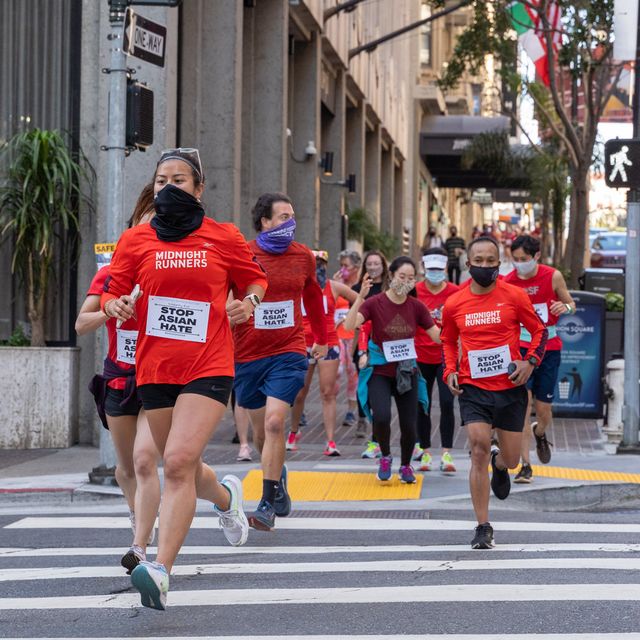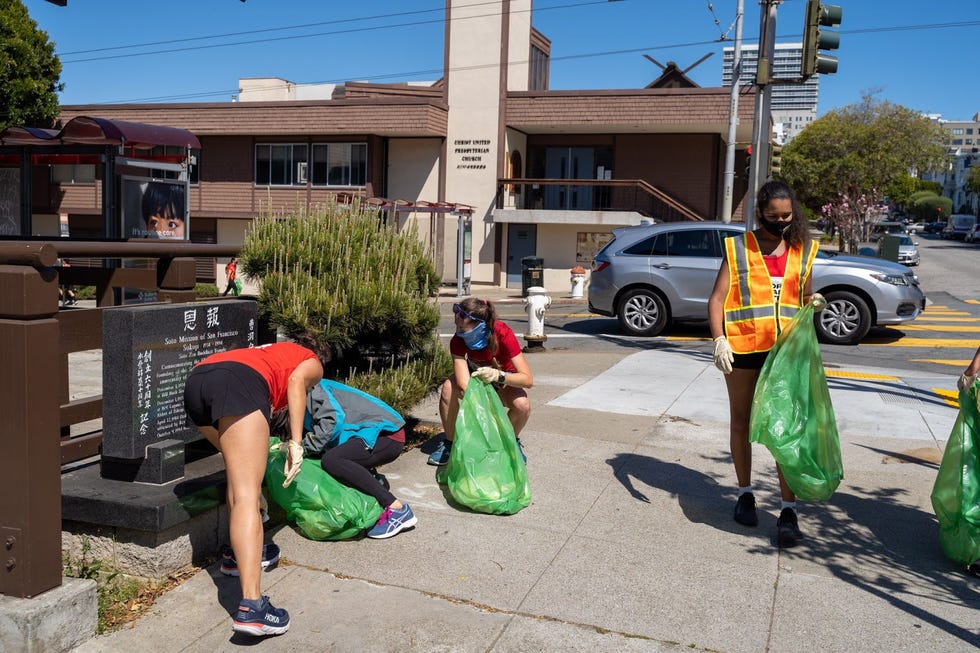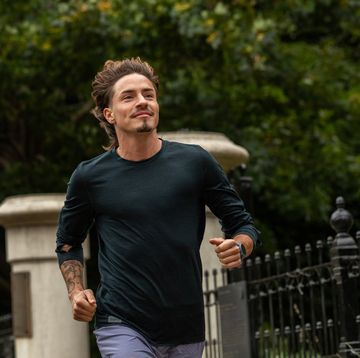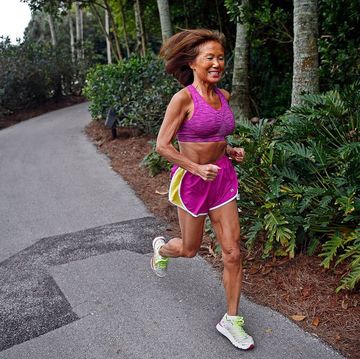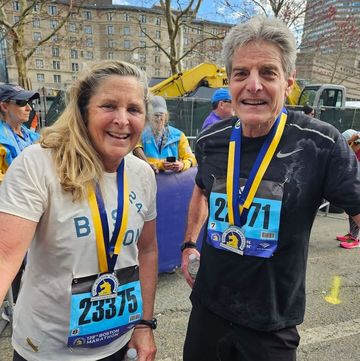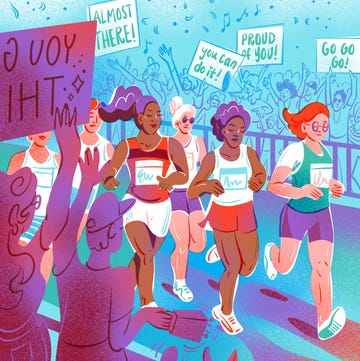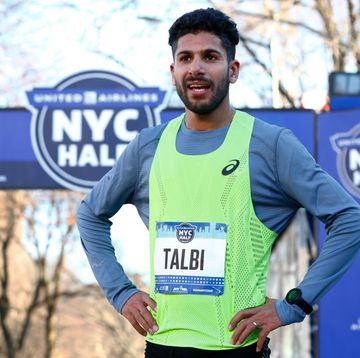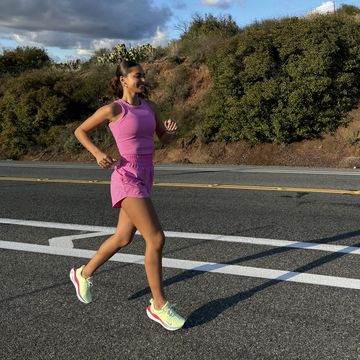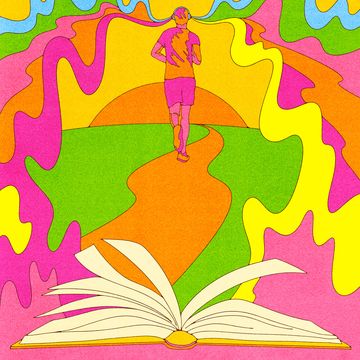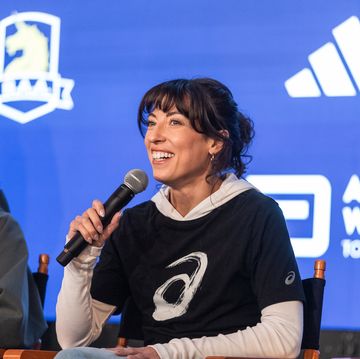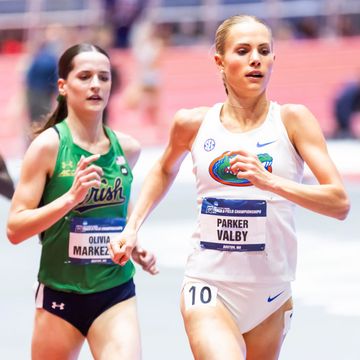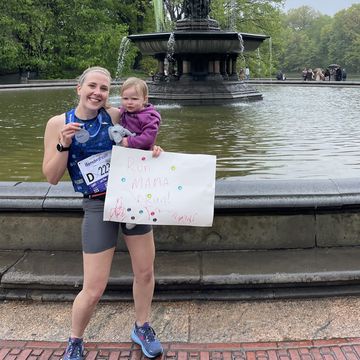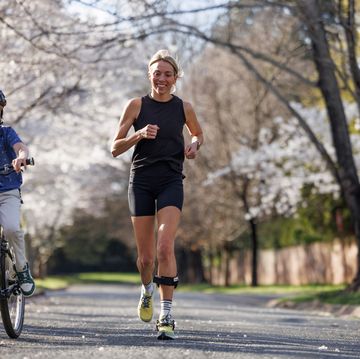The emotions are palpable as a megaphone is held in the air, allowing anyone within earshot to hear the words calling to protect those impacted by racial violence and to recognize the implications of gentrifying African American communities.
The crowd shouts in agreement—some raising their fist in the air, eventually making its way to the day’s running route. As they jog alongside each other, wearing race bibs and masks demanding justice and action with phrases, like “Stop Asian Hate,” cars honk their horns in agreement and cheering can be heard from the streets of San Francisco.
These runners make up the Anti-Racist Run Club, which made its inaugural appearance on the hilly streets of San Francisco in 2020 when 80 runners from different walks of life collectively ran three miles in protest of racial inequity. Inspired by Coffey, founder of New York’s Running to Protest, the west-coast running group can be found meeting every month at landmarks throughout San Francisco, like Oracle Park, the Peace Pagoda in Japantown, and Chinatown’s Dragon Gate. Through the group’s online platforms, like their Instagram page and website, runners are able to keep up with details on their monthly meetups.
The club, founded by Shelby Rhodes, uses its platform to listen to and center the communities impacted by racism, while partnering with those who have been doing the groundbreaking work and know what resources could be transformative and beneficial to the health, wellness, and uplifting of these communities.
This is done strategically through speakers, post-run group discussions or activities together, like writing letters to city officials, according to Bill Casher, a participant in the Anti-Racist Run Club.
“The goal of all Anti-Racist Run Club events and gatherings is to educate,” Casher told Runner’s World. “Each event has a topic which will challenge individuals to be introspective, check our own privilege, consider someone else’s experience, and live the change we seek in the world.”
On its one-year anniversary, June 6, 2021, runners met in the Fillmore District, once more commonly known as the “Harlem of the West,” to reflect and continue their year-long efforts of using personal and collective platforms to support communities impacted by racism.
Through the pace the Anti-Racist Run Club has set, there are learning points and actionable items that can be applied in and out of the world of running.
Don’t stop having important conversations
Hitting the pavement monthly as a group gives runners the check-in and push to continue confronting racism while recognizing that participants in the group have had all different types of experiences. For Casher, allyship was a driving force for him.
“I joined the Anti-Racist Run Club at one of its initial runs,” Casher said. “It was not long after the death of George Floyd and after having several very challenging conversations with my kids in our household. I wanted [to] bring them around people who were as passionate about social change as they were. I read that these runs were as much about the activity of running as it was about a follow-up discussion on how to be anti-racists, advocates, and change makers in our places of influence. I was excited for my kids to be around that energy and know that there is a diverse group of people who stand in solidarity with Black people—like us.”
The ability to intertwine conversations around timely matters throughout the year, like the importance of knowing ballots on both a local and national level during election season, is a principal component to the group.
→ Join Runner’s World+ to stay on top of the latest news stories!
Commit to advocacy long term
Reaching that seemingly unattainable running pace or seeing your body gradually strengthen as it takes on new terrains and more miles can be empowering yet challenging, as are social movements. With a firm foundation and mission, the group’s ability to tackle their goals did not waver as San Francisco and the country faced the new realities of a pandemic.
“As a new group forming during a pandemic, we moved with a lot of flexibility,” Ayako Sawanobori, participant in the Anti-Racist Run Club, told Runner’s World. “Some months were on Zoom, some months were more engaging than others, and going forward I see us shifting as needed.”
With the foundation of community advocacy already existing, runners continued to find ways to collectively meet and make plans, whether that was virtually or in-person.
“For the Run for Breonna month, we handwrote postcards demanding that all the officers be fired and charged, and that no-knock warrants are banned nationwide. For our main #stopasianhate run, we did a Japantown cleanup and patronized local businesses as a way for us to ensure that it’s a clean, safe, and thriving place. Anti-racist action can be a lot of things—as long as it’s an authentic commitment and not just performative,” Sawanobori said.
Center the voices of underrepresented people
“There is nothing more encouraging for someone like myself—BIPOC, Filipino, a minority—than organizing with a white person that has the passion and desire for social change like Shelby [Rhodes],” Casher said. “Her willingness to center the voices of underrepresented people, yet be active and organize with the enthusiasm in which she does, is at the core of being anti-racist.”
There has been intentionality in inviting partners and speakers to facilitate discussions, including the leadership teams of Running to Protest (the group that the Anti-Racist Run Club was initially inspired by) and Bounce Bay Area, to discuss topics, including why it’s crucial to create spaces where activities, like running and exercise, are accessible and welcoming for everyone.
“As a runner, an immigrant, and a woman of color, I was really inspired to see the community come together with the commitment to push for change. In the past few months, I’ve been an advisor in some capacity, and organized and led the three solidarity runs for the AAPI [Asian American and Pacific Islander] community,” Sawanobori said.
Supporting and uplifting these communities also means donating to already-existing justice and equity efforts. Over the past year, the Anti-Racist Run Club has raised thousands of dollars for organizations, including Techbridge Girls in Oakland, California, which encourages Science, Technology, Engineering and Mathematics (STEM) involvement in youth from low-income communities, and the Equal Justice Initiative, which takes on issues including fighting mass incarceration, which has historically disproportionately impacted Black men and women.
Ride the wave of contagious community activism
“We hope to continue using running as a mobilizer for change for today’s racial inequities. These runners in San Francisco continue showing up every month to do their part, and it’s inspiring to watch the long-term commitment,” Rhodes said.
Casher appreciates the representation of the city through the run club.
“There is a beautiful diversity that is unique to Anti-Racist Run Club events,” Casher said. “It goes beyond cultural diversity—there is a variety of opinions, life experiences, questions, and reasons for being there, all of which makes for a unique experience.”
It’s this collaborative spirit that has motivated runners, not only from San Francisco, but from surrounding cities—like Petaluma, Marin, and San Ramon—to join this union of runners for a common cause.
“Running is the tool to get folks together—meaningful discussions and actions is why we’re here,” Sawanobori said. “For me personally, I want folks to recognize their privileges and open their eyes to the amount of systemic discrimination exists in this country—police brutality, economic gap, sexualization and dehumanization, the list goes on.”
The timing is just as important as the collective energy. The core values intertwined with this work must be deeply ingrained in life—every day, month, and year. There is always more work to be done when taking on racism, and the power of community makes this surmountable.
